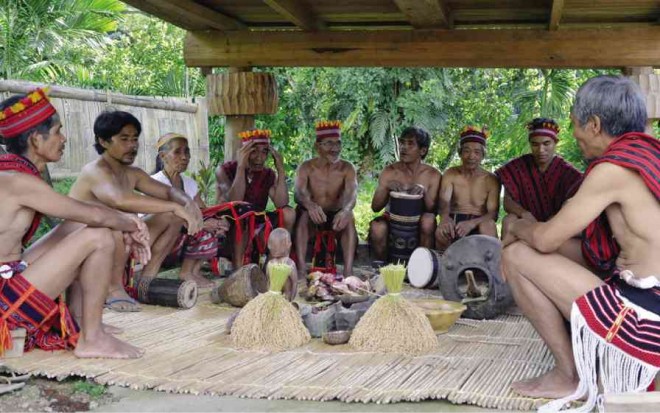Reviving an Ifugao ‘mumbaki’ ritual

‘MUMBAKI’ (native shaman), elders and villagers in the community of Bayninan in Kiangan town, Ifugao province, gather under the ‘alang’ (rice granary) for a ritual elevating a local mumbaki to a higher order. ELIZA CONSUL / CONTRIBUTOR
Forty-eight years ago in the village of Bayninan in Kiangan town in Ifugao province, the last “dawat di bagol” (receiving the deity) ritual was performed.
This was an elaborate ritual in elevating a “mumbaki” (native shaman) to a higher order called the “mumbagol,” a performer of the high prestige rituals in Ifugao society and culture.
The dawat di bagol was performed during the harvest season where the supreme gods and deities were invoked to bestow authority on the mumbaki to preside over the rituals.
These included the rice ceremonies performed throughout the cycle of the “tinawon,” the traditional rice of the Ifugao. The rituals are done to honor the covenant between the “I-Pugaw” (people of the earth) and the givers of the tinawon, the “I-Kabunyan” (deities of the Skyworld).
During the recent rice harvest in Bayninan, Simon Tuguinay, 66, a mumbaki, was elevated to a mumbagol through a rarely performed ritual.
In dawat di bagol, the presence of three senior mumbaki from neighboring villages was needed to celebrate the ritual, whose main role was to recite the elaborate and simultaneous prayer-chants and to transmit the sacred rituals involved in elevating a mumbaki to a higher level.
Along with newly harvested rice, native black pigs and chickens were offered to the gods and rice deities. The reading of the bile and liver of the butchered pigs by the mumbaki showed a good omen, allowing the community to proceed with the ritual.
Paraphernalia
The presence of ritual paraphernalia such as the “moma” (betel nut and leaves), the “palipal” (bamboo clapper), the “pama-ahan” (wooden bowl), “tingab” (ritual box), “bayah” (rice wine), and the “bulol” (rice god) completed the performance of this daylong ritual under the “alang” (rice granary).
During the ritual, Tuguinay was flanked by two elders representing his lineage, and a “binuhlan” (loincloth) was spread across his legs, where it was believed that the “bagol” (gods) would pass on to his body and mind as a sign of bestowal.
Tuguinay was seated with his hands on his head, imitating a seated bulol (rice god), while the other mumbaki, seated near the posts of the granary, were simultaneously chanting the prayers.
Village women chanted the “hudhud” (epic chant) as part of the harvest ritual and the other members of the community beat drums to help invoke the gods.
The rhythmic beating of the drums and the cacophony of voices were believed to call the supreme deities and ancestral spirits to accept the offerings and bestow the blessings and authority on Tuguinay.
The completion of the elevation ritual would allow Tuguinay to perform important prestige rituals such as the “uya-uy” (marriage feast) and the “hagabi” (ritual featuring a wooden bench and in rare cases, a bale or a traditional Ifugao house), including healing rituals.
“It is important to become a mumbagol in this village because nobody can perform the rice rituals anymore. It is important to protect my community from malevolent spirits, natural calamities and man-made disasters. Most of all, this is to ensure a continuous and bountiful rice harvest in the village,” Tuguinay said.
Dwindling
The number of mumbaki, who could perform sacred rituals, is dwindling in Ifugao.
“Many have been Christianized and educated, some have abandoned our traditional practices to look for better jobs, other than farming our rice terraces,” said Luis Bingwag, a mumbaki from Hungduan town.
“The younger generation of Ifugao are disinterested with the old ways, many have refused to become a mumbaki in favor of a college diploma nowadays,” Bingwag said.
A major reason for this decline is that the practice of being a mumbaki requires deep respect, patience and lifelong commitment in learning prayers and chants from memory transmitted by an older mumbaki who already passed away.
“It would be better to document our chants and practices, so that the next generation could read about us when we are gone,” said Bingwag.
The “baki,” a core belief system and the soul of the Ifugao culture, gives credence to whatever remains of this rich tradition.
The Save the Ifugao Terraces Movement, a nongovernment organization composed of volunteers, helps the rice terraces communities in the conservation and continuity of their cultural heritage, including the revival of this important Ifugao ritual.














